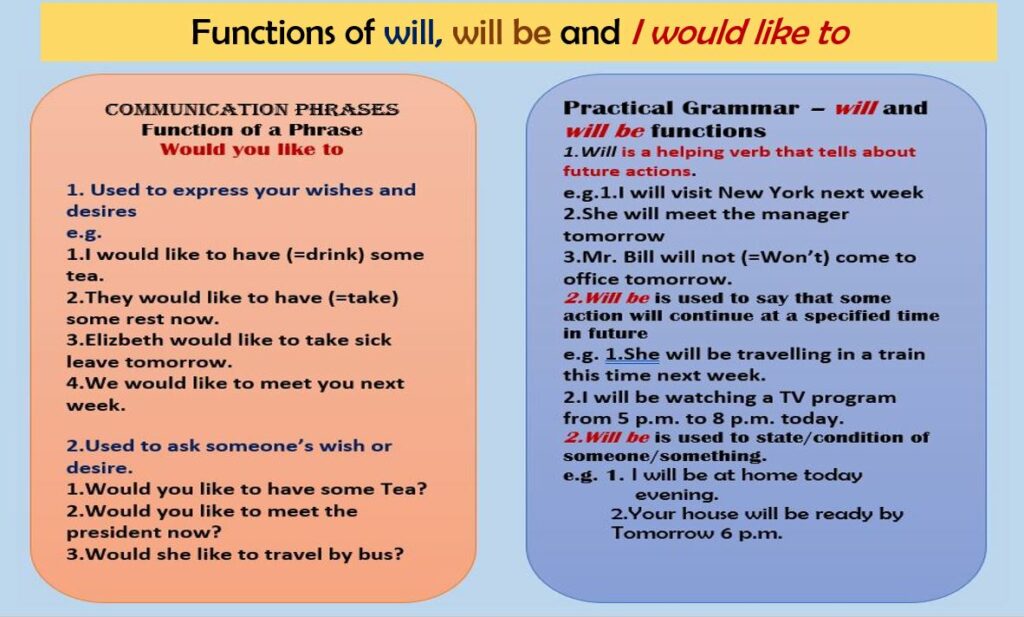Topics
Introduction to verbs in English – updated 11 Jan 2024
If you know how to handle the verbs, you know how to handle the language. Everything else is just vocabulary – Michel Thomas
The common definition of a verb found in most of the school grammar books is ‘verb is an action word’ Actually a verb is not an action word it’s the most important word in a sentence, a wrong choice of verb would make a sentence awful.
There are three main types of verbs in the Engish language: namely, a. Being verbs b. Modal verbs and c. action verbs.
Three Main Categories of Verbs in The English Language
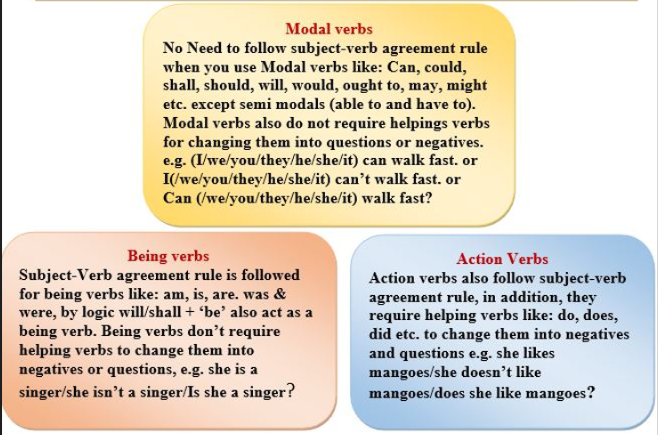
Super Simple Fluency Development Technique
Fluency Development is a very challenging task for non-native speakers, but there is a way out, you can follow the following technique to gain fluency like a native, in about a few weeks. Read the following instructions and watch the following video clip.
- Skip the Ads and play the ‘conversation’ video clip.
- Watch the first 3 minutes and 20 seconds, if it appeals, continue
- Divide the video clip into three four or five parts depending on the duration
- Watch the first part
- and watch the first part the second time (watch only the subtitles). Regulated the speed with the mouse.
- Watch the first part a third time (with the sound muted). Say the dialogue along with the characters, (do not memorize the dialogue) and make gestures as the characters do. play till you are comfortable with the first part.
- Play the other parts of the video clip, it may take one week, but it’s worth doing it.
- Follow or subscribe to the channel to watch other video clips, and make it a habit for the following six months. These video clips are more suitable for beginners.
- Sustained motivation 2. Commitment
Lesson 6 – Idea of subject-verb agreement in English
Subject-Verb Agreement
In a sentence every subject is followed by a verb (A verb is an important word in a sentence) wrong choice of a verb would make the sentence awful.
e.g.
I am a teacher (She = subject, is = verb) – The subject ‘I‘ agrees with the verb ‘am’ (I >am)
They are my friends (They = subject, are = verb) The subject ‘they’ agrees with the verb ‘are’ (They > are)
Mary works for a Bank (Mary = subject, works = verb) The subject ‘Mary’ agrees with the verb ‘is’
(Mary > is)
We talk about hundreds of subjects in our day-to-day conversations, for example, we talk about weather, education, government, friends, price-rise, travel, etc., now a question arises how to find suitable verbs for each subject? To solve this problem it’s a good idea to convert the subject into its pronoun form mentally before speaking or writing and reconvert them into their original form during the speech or writing. This conversion would help us to choose a suitable verb for any subject under the sun.
For example, when you speak about a bank mentally think of its pronoun (it)
A bank is a place to keep our cash safely (A bank = it is a place to keep our cash safely)
Mother Teresa was an India (Mother Teresa = she was an Indian)
Take a look at the subject-to-pronoun chart:
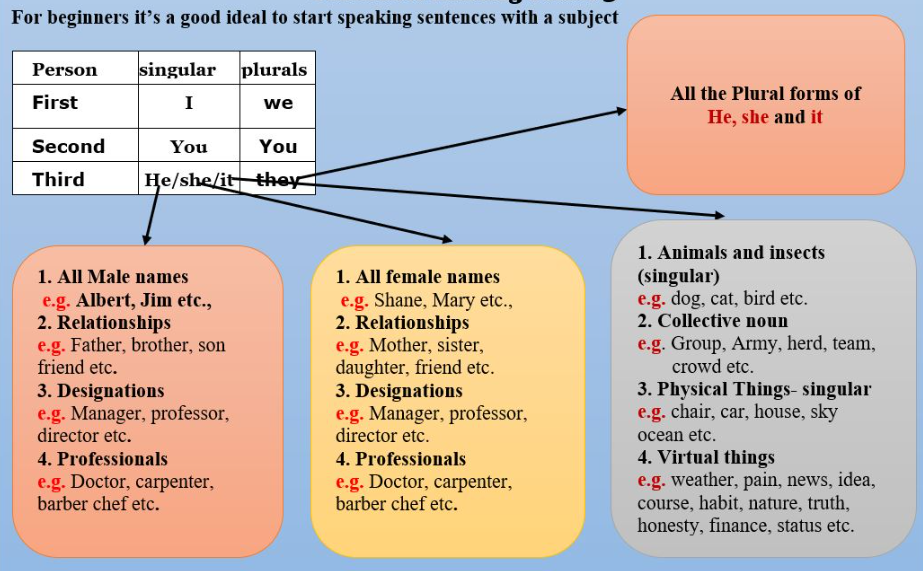
Lesson 5 – Idea of a subject in English
Getting an idea of the subject is very essential in making sentences in English. The Term subject has different meanings in different contexts, in this lesson, the term subject is a person place, or anything (anything: physical or virtual). A subject may be a single letter word for example: ‘I’ or a group of words ‘The President of India‘. Usually in an English sentence, the subject comes at the beginning of a sentence for example:
Stars are far away.
She is a singer.
In some sentences, the subject is left out, for example:
sit quietly. (=you sit quietly)
Don’t move from here, till I say. (= you don’t move)
Subject may come in the middle or at the end of a sentence too for example:
May God bless you.
May you live longer?
A subject may take several noun forms, look at the following examples:
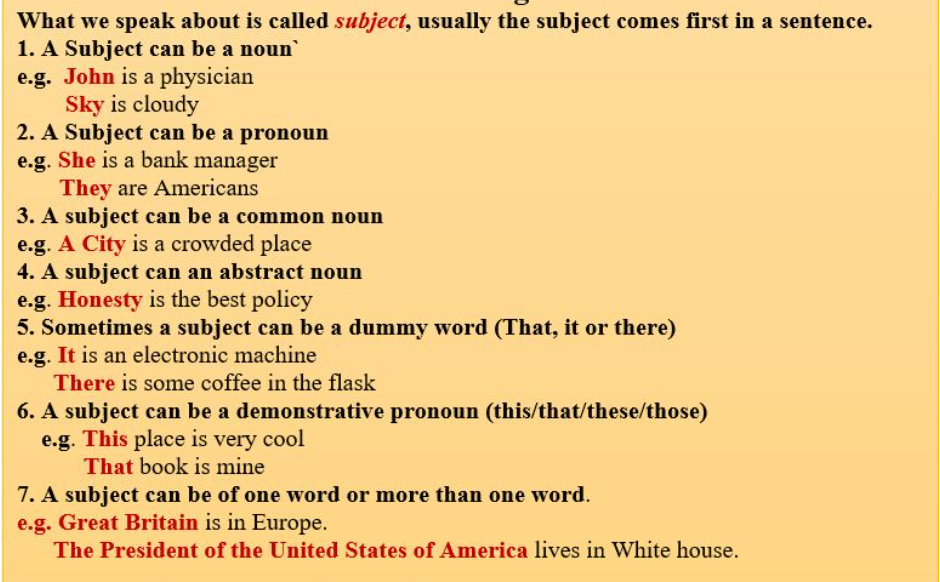
Lesson 4 – Components of Communicative English
Communicative English mostly consists of the following components, English grammar has the least role in Communicative English.
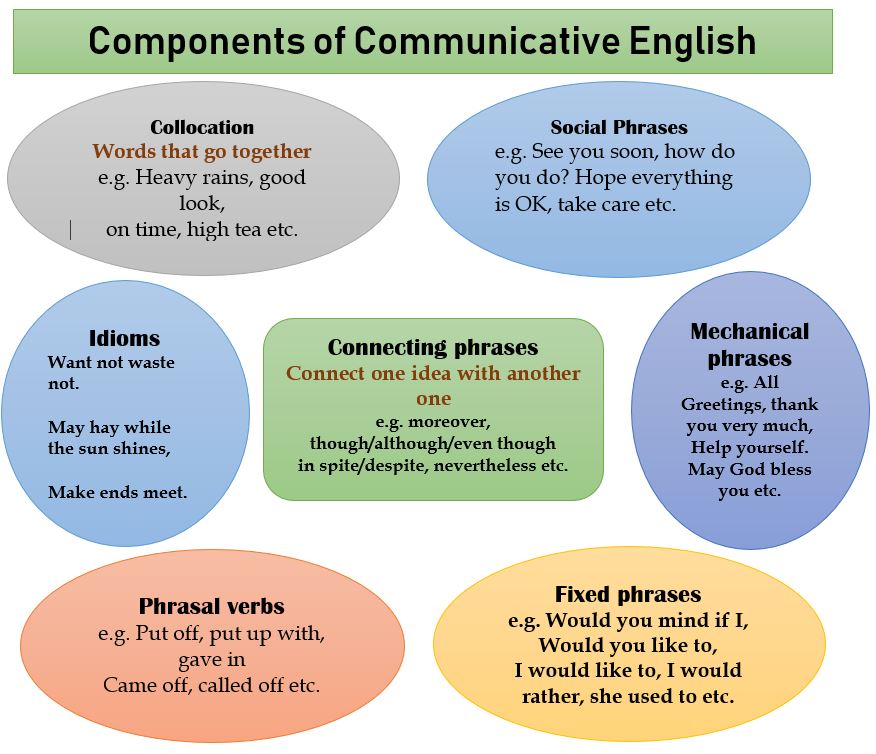
Lesson 3 – Attributes of Communicative English
If you wish to acquire proficiency in English faster follow the attributes mentioned in the following illustration.
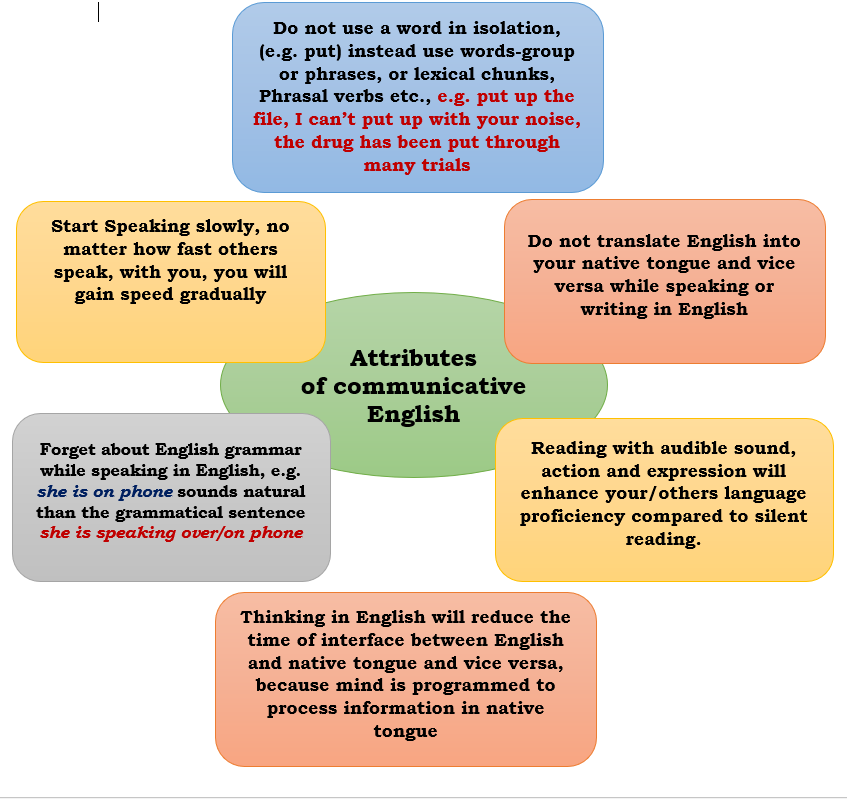
Lesson 2 – Your body language is the most powerful communication tool
In lesson 1, I said ‘spoken English composed of around 65 percent body language.’
Body language is the physical behavior, expressions, and manners to communicate without using words. Our facial expressions, gestures, posture, and tone of voice are powerful communication tools. We use body language to build better communication at home and work. In Short body language is a signal of communication.
Sometimes times behavior of people too communicate some information e.g. when someone relaxes, it means he or she doesn’t want anyone to disturb him. We also convey expressions of anger, question, amazement, happiness, exclamation, etc., through the movement of shoulders, eyes, hands, etc.
Say the following sentences using your body language. without changing the word order
A cat is drinking milk in the kitchen ( say in a normal tone).
A cat is drinking milk in the kitchen ( say in an angry tone).
A cat is drinking milk in the kitchen ( say in a questioning tone).
Ha, ha, ha, A cat is drinking milk in the kitchen ( say in a joking tone ).
Speak the following sentences in above mentioned tones.
- She goes to the office at 10’ O clock every day. 2. He sold his car for 500 dollars.
Lesson 1 – Confidence is the Key to acquiring English skills faster.
Are you new to English? No worries
Body language is more important than English Words In Spoken English, this means you already know around 65% of Spoken English skills, so to speak around 65% of the English language, you are not required to know even a single word.
Another good news is that English vocabulary has more than 50,000 words, you just need to know only 500 words to speak around 80% of the English language, I am sure every student knows more than 500 words.
The essential requirements to speak good English in a short period are:
- Sustained motivation 2. Commitment
ARCHIVES
Subject-verb agreement is essential for making sentences
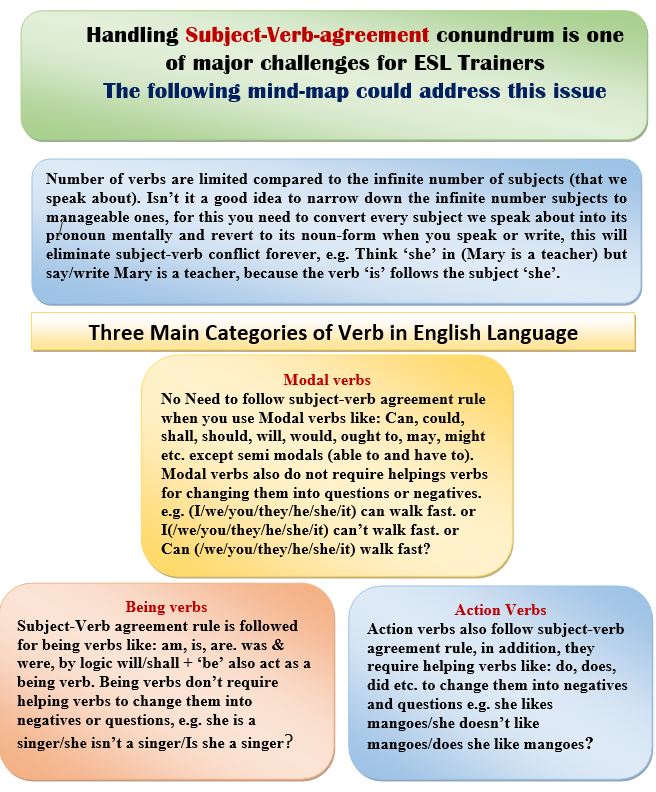
Back to top
English Skills – 22 Feb 2023 – Being Verbs in English
Introduction to Verbs in English and basics of sentence making 2 (using being verbs)
The verb is an important word in a sentence
Verbs may be used as a main verb, or an auxiliary verb =Helping verb = supporting verb
She is a teacher (Is = the main verb)
She is teaching English (Teaching = a main verb and is = a helping verb)
There are three main verbs in English:
a. Being verbs
e.g. am, is, are, was, were, shall/will + be
Denote the existence or non-existence of someone or something (Physical and Virtual)
b. Action verbs
Describe actions: e.g. Read, walk, watch, etc. They have five forms, name Present, Past, Past participle, Present participle, and future form
c. Modal verbs or Modals
These verbs are used for expressing possibility, probability, permission, etc.
e.g. Can I sit here?
Being Verbs – Am is are
1. Structure – Statement/information/message/declarative question etc.
| Person | Singular | Plural |
| First | I + am | We + are |
| Second | You + are | You + are |
| Third | He/she/it + is | They + are |
Model sentences
I am Shane.
I am 32. (age)
He is married.
We are classmates
She is my cousin.
The weather is fine.
It’s very playful (it= a puppy)
2. Structure – ‘yes/no‘ question
| Person | Singular | Plural |
| First | am + I | are + we |
| Second | are + you | are + You |
| Third | is + (He/she/it) | are + They |
Model sentences
Are you Clara?
Is she busy now?
Am I late today?
Is Joe in the office?
Are they ready to come?
3. Structure – Negative sentence
| Person | Singular | Plural |
| First | I + am + not | We + are + not |
| Second | You + are + not | You + are + not |
| Third | He/she/it + is + not | They + are + not |
Model sentences
He is not Jim.
I am not a student.
They aren’t Indians.
The president is not in the Capital
We are in the office.
NOTE: are not = aren’t and is not = isn’t
4. Structure – ‘yes/no’ negative question
| Person | Singular | Plural |
| First | am + I + not | are + we + not |
| Second | are + you + not | are + You + not |
| Third | is + (He/she/it) + not | are + They + not |
NOTE: are we not = aren’t we, are you not = aren’t you, is he not = isn’t he, are they not = aren’t they
Model sentences
Aren’t you Lee?
Isn’t she an American?
Aren’t they busy?
Isn’t it right?
Isn’t he the manager?
5. Structure – ‘wh’ question
| Person | Singular | Plural |
| First | ‘wh’+ am + I | ‘wh’ + are + we |
| Second | ‘wh’ + are + you | ‘wh’ + are + You |
| Third | ‘wh’ + is + (He/she/it) | ‘wh’ + are + They |
‘Wh’ indicates ‘wh’ question words like when, what, where, why, etc. ‘wh’ question needs a full answer
Model sentences
Where is she?
How are you?
What is he?
Who are they?
Why is she late?
Go to top
Develop your Fluency
Follow these steps to develop your fluency in English – Click on the image
- Skip the Ads and play the ‘conversation’ video clip.
- Watch the first 3 minutes and 20 seconds, if it appeals, continue
- Divide the video clip into three or four or five parts depending on the duration
- Watch the first part
- and watch the first part the second time (watch only the subtitles). Regulated the speed with the mouse.
- Watch the first part a third time (with the sound muted). Say the dialogue along with the characters, (do not memorize the dialogue) and make gestures as the characters do. play till you are comfortable with the first part.
- Play the other parts of the video clip, it may take one week, but it’s worth doing it.
- Follow or subscribe to the channel to watch other video clips, and make it a habit for the following six months. These video clips are more suitable for beginners.
Making an appointment directly
May I see you on Monday?
Could I/we meet you this evening?
Are you available at your office/clinic this evening for a consultation?
I would like to have an appointment regarding some financial issues with my business, what time are you available?
Making an appointment directly (semi-formal)
Could I meet you this evening?
Is it OK if I see/meet you on Monday/this evening?
Can we meet at Robinson Square……this evening/tomorrow morning?
Is it OK for you If I meet you at Ruby Park tomorrow afternoon at 2?
How about meeting at Central Square tonight at 9?
May/shall I drop by your office while returning home today evening?
Can I/we expect you at Elizabet’s party tonight?
I wonder if you could spare a few minutes this evening for me to discuss my new business Plans?
Making an appointment through the Secretary/receptionist/personal assistant
I would like to see Doctor Sen for a consultation this evening, is he available?
Could I expect an appointment with the Attorney tomorrow evening, about………?
Is it possible to see/meet the chairman tomorrow afternoon?
Can I meet the President today at 6 p.m.?
Is the Lawmaker available today at 7 p.m.?
Can I have an appointment with the auditor on Thursday evening?
Conceding or accepting an appointment
Yes, you can see/meet me this evening I am available till 7.
You are welcome, Please try to come/drop by 7 p.m.
Yes, I will be here till 8 p.m.
Yes, I am available you can see/meet me this evening.
I think Saturday will be OK, because, I am away on a business tour.
Sure, you can come any time between 5 and 7 p.m.
Yes, tomorrow evening is perfect.
Yes, tomorrow morning is fine.
What time would you like to drop by?
Declining/deferring an appointment politely – A
Sorry, the Attorney is away on vacation
Sorry, He/she won’t be back until 2nd June.
We are extremely sorry to say that the doctor is not available this week for appointments.
I am afraid (= sorry) he may not be available tomorrow evening, however, you can see him the day after tomorrow.
I wish I could see you, but I have to leave for London tonight, Is Monday 2nd Jan OK for you?
I wish I could give you an appointment, but I have to be in New York for some important work.
I am afraid I won’t be available tomorrow, Is Friday evening OK?
I am really sorry I am unable to attend the office at 4 p.m. today, Is tomorrow OK for you?
Oh………7p.m. …. It’s difficult for me to come will 8 p.m. be OK?
I am afraid it’s not possible today.
Oh, Thursday it’s a very busy day for me, I would rather prefer Saturday, Is that OK?
I need to advance my appointment on Monday (by one day) is it possible?
Canceling an appointment politely – B
I am sorry I have to cancel my appointment due to an emergency meeting at Margret’s
I am extremely sorry to cancel my appointments due to heavy rains and floods in and around the town.
Sorry I made a mistake which conceding an appointment actually I am away at a meeting tomorrow, will Monday be OK for you?
Sorry, I am not available tomorrow, shall I reschedule the appointment for Sunday evening?
have and have to
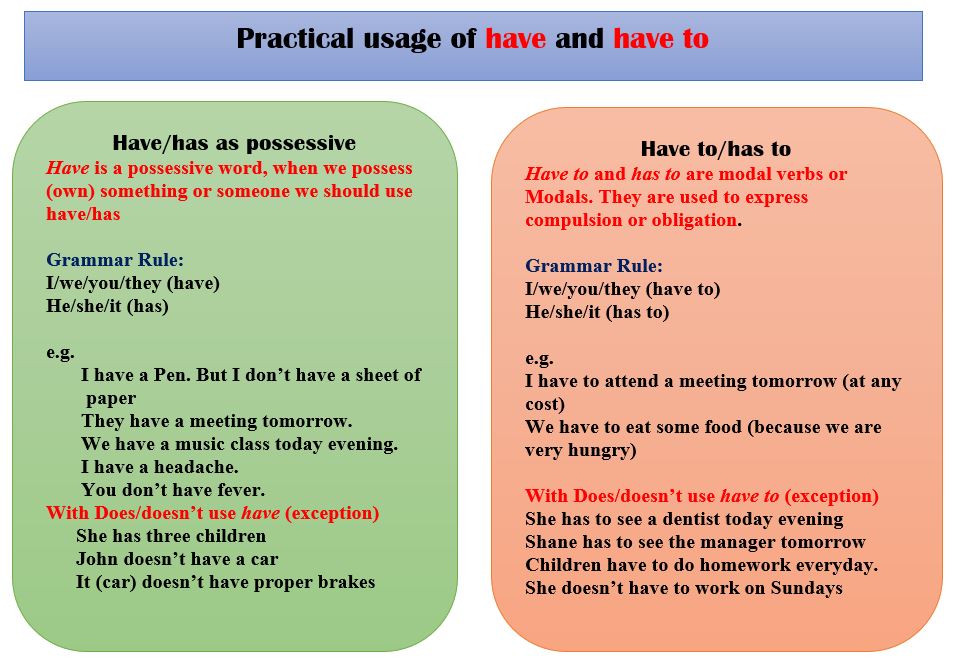
Go to Top
A word a day will make your day 14/2/2023
